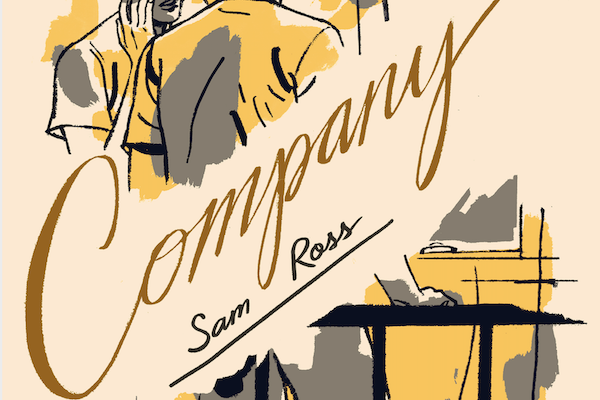‘Company’ by Sam Ross

Author: Horatio
March 27, 2019
In his debut collection Company, Sam Ross focuses on what lingers, exploring the idiosyncratic and at times seemingly indiscriminate nature of memory. When suffering takes many shapes and sizes yet appears as persistent fact, how may we forge memories that shimmer, so that love matches the loss? The answer often appears in the company we keep. Ross captures how delicate and dangerous connection can be—especially sexual connections and the truths they reveal—yet Company offers testimony for not turning one’s back on those intimate ties that bind.
Ross’s poetry is refreshingly crisp and unaffected, taking the quotidian and the extraordinary as part and parcel. His tone frequently turns conversational, providing glimpses of vernacular familiarity perhaps reminiscent of James Schuyler. In “Time Expanding the Air Forcibly” Ross asks, “About the picture, you said that’s how it felt, / but not how it looked. How could that be?” Ross fascinates over visual limits, playing games by covering his eyes in “Struck” (“so the sun becomes another thing sewn up / tied inside. I am making a mystery / where none exists”) and yearning to be seen differently in “Tableau Vivant”:
_____What I want you to see
what is backlit, behind me.
_____Not the silhouette—
but the negative space
I make blocking light.
These poems bookend “After Assault,” a striking piece where violence extinguishes the visual (“Quick to flee— // dark swam on a path no one else could see.”) Here Ross’s lines approach the ephemeral, as readers work alongside Ross to piece together what has happened: “Less the blood than the timing // Running till my mouth unlatched in the street.” The poem offers harrowing insistence that what remains is not event but feeling, enigmatic clues toward recreation.
This is not to say Ross keeps his eyes closed; much of Company finds Ross making sense of what certain visuals reveal. From shooting a heron trapped by a fishing line to lawn mowing around a snake in seizing throes, Ross can sound detached from the suffering he encounters. Indifference, however, emanates not from Ross but the world we share (“clouds coiling through a mountain pass // revealing the landscape’s real form— / indifference.”) Referencing the Elizabeth Bishop line “The War was on,” Ross notes, “one can end // any poem like that and still / tell the truth.” The poems in Company don’t avert their gaze from the suffering of the natural world, nor do they ignore the suffering we do onto each other. Blood is a frequent motif in this collection, and it receives particularly careful consideration in “Recommendation (Number 9)”:
_____Blood resists form, handful of mercury.
After the hurricane, I tried to
offer mine. After every_____disaster, deferred—in spite of a red
sign that says We are always in need.
From bureaucratic discrimination to physical assault, the queer subject in Company knows its proximity to human violence. Within this landscape, even jokes from a cashier taking credit card information ring ominously (“And the last four digits, she said. And a fingerprint, she laughed. And your / blood, she laughed.”) As a result, when a narrator in one of Ross’ poems details the night they said love for the first time, it is a shock but not a surprise when the narrator notes awaking the next day with blood filling their eyes.
Ultimately, Company attempts a reclaiming of the past despite the violence enshrined therein. As Ross notes in the collection’s concluding piece, “I began // to call something like the past mine / only recently.” This past is comprised of small moments of intimacy and joy, often in the face of hostility. “Bowers v. Hardwick” derives an air of intolerance from its title yet depicts remarkable quotidian joy (“Or we can just spend the day / drawing dirty pictures of each other. / There’s time.”) While “Still Animals” begins again with the sight of animal death, it ends with the sweetness of two bodies intertwined at night (“arranged in the position you called your favorite: / my mouth at your neck, barely, and you feigning sleep.) If fleeting, these moments feel especially meaningful, fragments toward a useable past. The final words in Company offer as much: “Little history— / sweep it from the floor— // put the light in me.”
The poetry of Company displays a clear care for precision and a delicate approach to sentiment. Ross’s stanzas often break quickly, and his concision brings a gentle musicality to many of the poems here. Ross’s style allows his images—the terrible and precious alike—to emerge vividly. Company is a promising first collection, one that passionately offers argument for pursuing certain connections—perilous as they may be—and never loses sight of the work such connection requires: “I would learn rare // and love and want and wait, / I had to start at the beginning.”
Company
By Sam Ross
Four Way Books
Paperback, 9781945588334, 112 pp.
February 2019

